
Comment devenir recruteur dans la technologie : 7 étapes simples

How to become a recruiter and how can you improve your hiring skills if you’re already an active recruiter? There are a number of things you can do to be more successful in HR, regardless of your level of advancement. In this post, we show you how to become a recruiter in tech, as well as improve your skills as a professional tech recruiter. We also present you with actionable tips that are easy to implement so you can get started right away.
What is a technical recruiter?
A technical recruiter is a professional who specializes in finding candidates for IT positions. They work closely with hiring managers to find and hire suitable candidates for open positions. Technical recruiters can either work in-house within the HR team or for a third-party recruitment company.
How to become a technical recruiter and what is the typical salary?
Although the string of decisions that leads to becoming a recruiter is not identical for everyone, in most cases it starts with the right education (this topic is covered in detail below in section 1).
However, becoming a recruiter is not only about your academic background or previous professional experience. If you’re wondering how to become a recruiter, you need to start with having a specific skillset AND mindset. According to Joel Spolsky, “If you are a recruiter you would be a bad programmer. If you are a recruiter, programmers don’t like you because you don’t realize that.” As Spolsky says, recruiters are typically people who like people, enjoy phone calls, and thrive on ambiguity. When you think about how to become a recruiter, you should really consider whether what Spolsky talks about sounds like you.
If you’re asking yourself “how to become a recruiter?”, you should also think about the compensation you’re likely to receive. Median 2017 human resources specialist annual wage was $60,350 according to the Bureau des statistiques du travail. Based on PayScale data, the average pay for a Technical Recruiter is $48,734 per year (median $50,863).
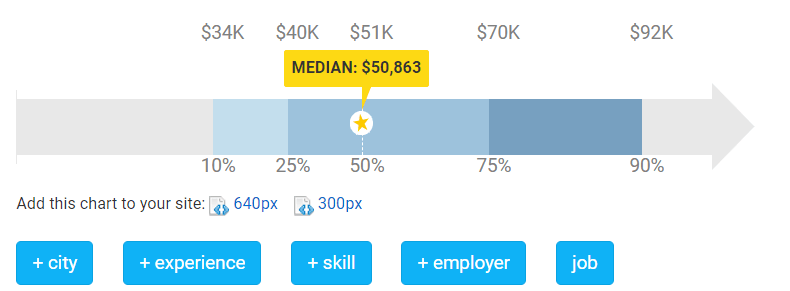 Source : PayScale
Source : PayScale
If you’re asking yourself “how to become a recruiter in tech?” because you want to specialize in hiring technical talent, you should be aware that you’re facing a tall task. The number of tech job offers is sky-high as even non-tech companies are looking for developers. Hiring in IT is tough because of the demand for qualified workers who, in most cases, are currently employed and are not actively looking to make a job move. Tech recruiters chase after the same pool of candidates and only the best ones succeed. As a consequence, only the cream of the crop HR pros have the chance of hiring the best tech candidates.
A note at this point is that even if you’re successful at hiring developers, there’s always room for improvement. Here are seven surefire ways to start your career in recruitment or improve your current skills:
1. Educate yourself
If you find yourself thinking “How to become a technical recruiter?”, the educational background would be the right place to start. According to the Bureau of Labor Statistics data, the typical entry-level education for human resources specialists is “a bachelor’s degree in human resources, business, or a related field. Coursework typically includes business, industrial relations, psychology, professional writing, human resource management, and accounting.”
[emaillocker id=”115882″]
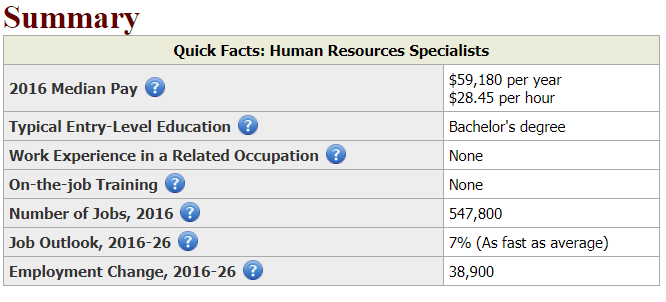 Source : Bureau des statistiques du travail
Source : Bureau des statistiques du travail
En tant que LinkedIn reports, the most common university majors of recruiters include Psychology, Business, Marketing, Human Resources, and Sociology.
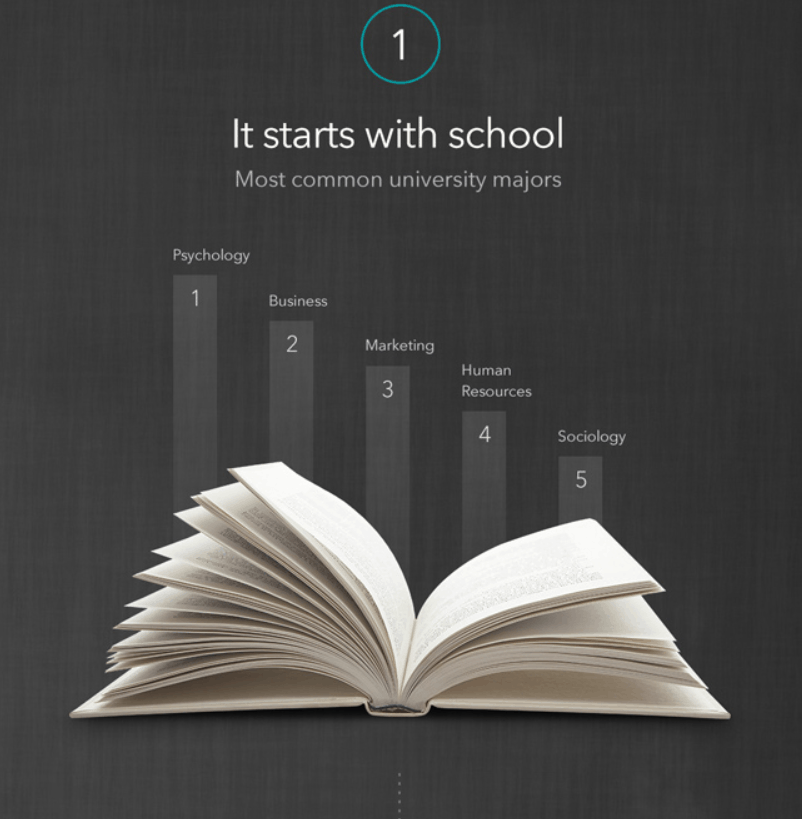 Source : LinkedIn
Source : LinkedIn
Since you’re reading this, you’re probably asking yourself how to become a recruiter and it’s likely that you’re considering a career change. Don’t worry, you’re not alone. Based on Données LinkedIn, top past jobs before becoming a recruiter include Sales, Operations, Administrative, Support, and Research positions. Interestingly, according to Esther Cruz, it’s not uncommon that “recruiters who studied computer science first went into programming, then switched to become technical recruiters later in their careers”.
The Bureau of Labor Statistics reports that some Human Resources positions require previous work experience. The best way to gain experience is through Human Resources assistants jobs, customer service positions, and other jobs of this type.
2. Perfect your non-academic skills
Your degree probably reflects your interests and passions, but there’s much more to recruitment than educational background. There are some personality and cognitive traits that make you predisposed to succeed as a recruiter. According to the Bureau des statistiques du travail, these include:
-
Compétences en matière de communication

Source : University of Kent
As a recruiter, you must be able to get your message across as well as pay attention to all questions and potential concerns of your candidates.
-
Compétences décisionnelles
Human resources specialists must make decisions day in day out, as well as resolve disputes or defend their point of view whenever necessary. Being indecisive is definitely a huge red flag.
-
Le souci du détail
In HR, being able to identify meaningful information when evaluating applicants is key. Recruiters also need to be focused when they run background checks or maintain records, so you shouldn’t panic at the sight of a binder. If you hate paperwork and making phone calls, you should definitely reconsider.
-
Interpersonal skills
Recruiters are always meeting new people from different backgrounds and have to interact with them on a daily basis. Feeling intimidated by people you don’t know may indicate future problems in the role.
If you’re reading this article, you probably feel you’re psychologically predisposed to become a recruiter. Remember that practice makes perfect and try to work on these skills to prepare yourself for the job. Attend conferences, industry events, network with people, or consider getting an administrative job to see if you enjoy it. Ask yourself “How to become a recruiter?” well before you’re looking for your first job in HR.
3. Know your tools (and be open to new ones)
The number of recruitment tools on the market today is overwhelming and in many cases, finding the right one takes a lot of time. Picking the right tool usually means you have to go through a number of demos so you can make the right decision, which is very time-consuming.
That said, I strongly believe it’s an investment worth making. If you streamline the hiring process with the right set of recruitment tools, it’s bound to save you a lot of time you typically spend on manual work. Bear in mind that automating the right tasks means you have more time to work on personalization, without sacrificing overall quality.
Be smart about what you decide to automate. Take advantage of integration opportunities to spend as little time as possible on moving things around, or even better, choose solutions allowing you to do more than one thing (i.e. developer screening and interview, like our very own DevSkiller).
4. Learn to evaluate your hiring efforts
Modern recruitment and marketing have much in common and that’s not necessarily a bad thing. Recruiters should rely on data and the best way to use it is through available analytical tools that allow evaluation and optimization of the recruitment funnel (just the way marketing and sales professionals analyze & optimize their funnels).
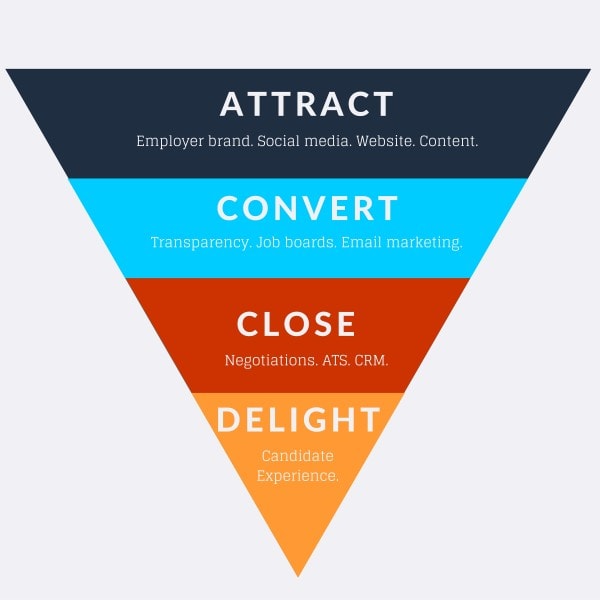 Source : Brazen
Source : Brazen
Take a good look at your recruitment funnel and try to identify at what stage in the process it’s happening and why. Once you do that, find ways to make them stay.  You should be constantly optimizing your hiring efforts for Quality of Hire, Cost per Hire, and Time to Hire. In many cases, it’s not whether you do something or not but HOW you do it. Execution is key – everyone uses LinkedIn in sourcing technical talent and writes emails, but only some recruiters have the skills to access the “bottom of the pile” candidates and encourage them to join your recruitment process.
You should be constantly optimizing your hiring efforts for Quality of Hire, Cost per Hire, and Time to Hire. In many cases, it’s not whether you do something or not but HOW you do it. Execution is key – everyone uses LinkedIn in sourcing technical talent and writes emails, but only some recruiters have the skills to access the “bottom of the pile” candidates and encourage them to join your recruitment process.
5. Get a clear understanding of your candidates
The relationship between developers and recruiters is a rocky one because these two professional groups are very different from each other. If you’re wondering how to become a recruiter (a good one, to be precise), it’s about being able to understand the needs and preferences of software developers, as well as the nature of their work. This way, you get to know what they value as well as avoid the biggest mistakes commonly made by recruiters.
Read the reports available on the subject (Stack Overflow has excellent annual reports called Global Developer Hiring Landscape – you can find the 2017 edition here, it’s a must-read for all technical recruiters). In one of our posts, we’ve actually put together a list of 30 key developer hiring insights (including data from Stack Overflow) so it’s a great place to start.
6. Create a positive candidate experience
People blame recruiters for all the negative experiences they encounter during the recruitment process. If you want to be more successful in hiring, you need to remove negativity from the recruitment process and create a positive candidate experience.
Creating a positive candidate experience is a complex process that has to be designed from start to finish. It comprises:
-
Job adverts
These should be clear and informative. A good job ad should provide info on location, salary range, tech stack, duties, specific job tasks, benefits, perks, and training.
-
Recruiter communication
Sadly, talking to recruiters seems to be the bone of contention, mostly due to recruiters who fail to personalize and don’t understand even the most basic IT terminology.
-
Careers page
A good careers page should be optimized for mobile (especially when it comes to IT staff – you need to show your candidates you practice what you preach). It should present your company values, history, as well as humanize your brand with content.
-
Application process
This is where many of your potential candidates drop out, in most cases because the application process is not user-friendly or too long. Follow the KISS rule (Keep it Simple, Stupid).
-
Screening and interview procedures
Providing candidates with a realistic preview of the future job is a way of reducing turnover. The best way to give them a glimpse of their future work environment is to use technical screening software collecting works samples in a manner imitating their first day at work.
-
Rejection
The way you reject people tells volumes about what your company is like. Though difficult, rejection is an essential part of the recruitment process. Reject people with respect and you might find that they’ll come back to you later in the process.
-
Offer
Make sure the offer is timely and that the salary offered is fair and remains in accordance with industry standards. Remember that even if people like what you have to offer but you take too long to give it to them, your chances of hiring the candidate are slim.
-
Notifications (throughout the entire process)
Giving people regular updates about the status of their application is essential to prevent people from dropping out of the recruitment process.
I wholeheartedly recommend Lewis’s post on creating a positive candidate experience for software developers which presents all of these stages in more detail.
7. Keep learning (and hey, get tech recruitment certified for free!)
No matter how experienced you are, you need to stay open to new ideas and new ways of doing things because the world of recruitment is a dynamic one. The Bureau of Labor Statistics reports that in Human Resources, certification is not formally required, and “Specialists can increase their chance of advancement by completing voluntary certification programs.” If you’re still wondering how to become a recruiter, courses and certifications are definitely a great way of enhancing your HR skillset.
I’d definitely recommend embarking on a free online course for at least three sound reasons:
- you can improve your skills
- you get authentication of your abilities
- you grow your chances of getting a promotion
You might know a lot about technical recruitment, but others (including your potential employers) don’t know that unless you show them. Completing courses and certification programs is a great way to do that. Did you know that your completed certification programs are visible on your LinkedIn profile? You can find them in the “Accomplishments” section, right below your endorsements.
There are multiple courses dedicated to HR in general. At DevSkiller, we’ve created a special certification course for tech recruiters which is completely free of charge. The course covers the fundamentals of hiring technical professionals with a strong focus on techniques, tools, and strategies which can help you become a better tech recruiter.
Oh, and one more thing: when you get certified and share your certification badge, it shows up in the LinkedIn feed, which serves as social proof of your skills.
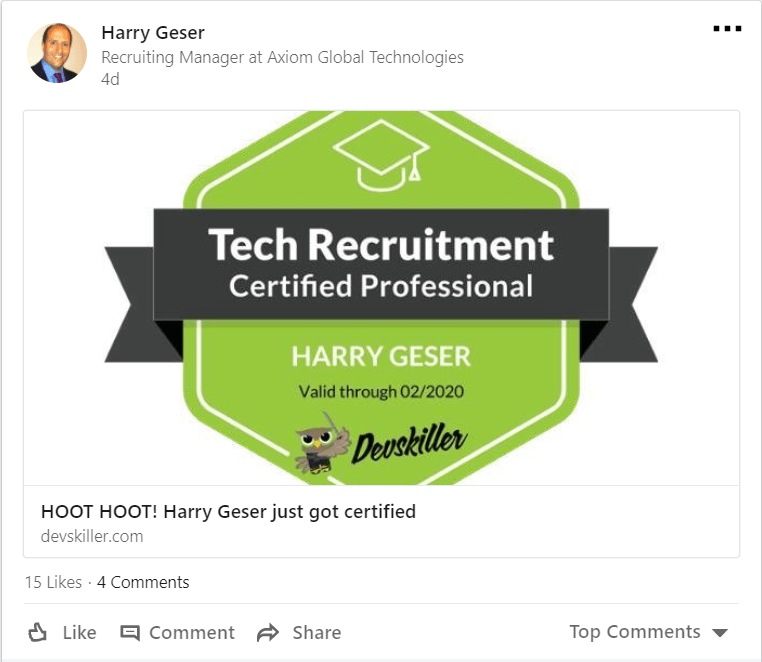 There are a number of courses you can take, and don’t think you should limit yourself to Human Resources ones (although they should be your priority). Recruiters have valid tasks which require a number of skills, so once you complete your recruitment training, you can also complete other courses which can improve your presentation skills, negotiation tactics, or even online marketing (since modern recruitment has a lot of common with marketing).
There are a number of courses you can take, and don’t think you should limit yourself to Human Resources ones (although they should be your priority). Recruiters have valid tasks which require a number of skills, so once you complete your recruitment training, you can also complete other courses which can improve your presentation skills, negotiation tactics, or even online marketing (since modern recruitment has a lot of common with marketing).
How to be a technical – key takeaways
Remember that since you work in such a competitive space, you need to be on top of your game. Developers are not an easy group to recruit, so keep learning and as you progress, do whatever you can to understand the industry and the professional group you’re trying to recruit. Follow influencers, read reports from industry leaders, and stay curious as you grow professionally. Throughout your career, keep asking yourself the questions that got you started in the first place, such as “How to become a recruiter?” and “How to get better at recruitment?”.
Make sure you have a great understanding of the recruitment process in your organization. Even though it’s probably far from perfect, designing a structure that can be replicated and reevaluated once you start making changes is, without doubt, a step in the right direction.
[/emaillocker]




